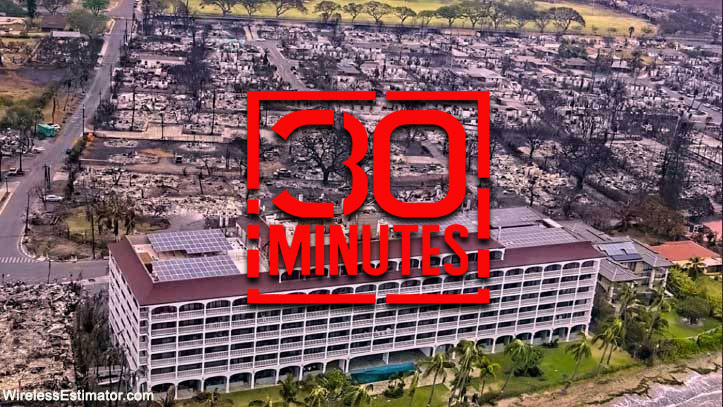
Maui County has sued the state’s major mobile carriers because they didn’t report within 30 minutes, as required by federal law, that their network was down, affecting 911 and other services. However, it appears that carrier networks might have been operational during the early hours of the fires that ravaged the area, and texts and other 911 services were available. It’s possible that answers to the complaint will expose that the primary hindrance for evacuation was due to Maui Emergency Management Agency’s decision not to sound the island’s 80 outdoor sirens as a wildfire approached Lahaina town, where the most damages and deaths occurred.
Maui County has launched a lawsuit against several major wireless service providers, accusing them of failing to notify emergency management officials of network outages during the devastating wildfires on August 8, 2023, which resulted in the deaths of at least 101 people. The lawsuit was filed in Maui Circuit Court and details how the alleged communication failures hindered evacuation efforts during a critical time.
Maui County initiated legal action against Verizon Wireless, T-Mobile USA, Spectrum Mobile, and AT&T.
According to the complaint, the county employs a system known as Wireless Emergency Alert messaging to send vital evacuation and safety information to both residents and visitors. On August 8 and 9, as fires ravaged parts of the island and first responders worked tirelessly to provide aid and evacuate individuals, Maui County sent out no fewer than 14 separate emergency messages directly to cell phones.
David J. Minkin, an attorney from McCorriston, Miller Mukai, and McKinnon LLP, representing Maui Corporation Counsel Victoria J. Takayesu, stated in the lawsuit that these messages were crucial for immediate evacuation and safety guidance. However, unbeknownst to the county officials, these alerts went undelivered as the island’s cell towers, including all 21 towers serving West Maui and additional towers in Kula and Olinda, suffered from widespread outages.
However, according to Wireless Estimator reporting, most of the cell sites and their carrier tenants appeared to be operational when the fire first ravaged the area and were within the framework of the carriers not having to report outages. It wasn’t until approximately a day or two later that some sites were down due to backup generator fuel supply issues and other compound damages.
Verizon, T-Mobile, and AT&T have not responded to requests for additional information.
The complaint underscores that the county was unaware of the magnitude of these service failures during the fires. Under federal law, telecom companies are required to report any service disruptions to the county’s 911 service operators within 30 minutes of occurrence.
These outages not only prevented the delivery of emergency texts but also disrupted 911 calls and communications essential for coordinating first responder activities, the complaint said.
The FCC’s criteria for outage reporting is typically based on factors such as the number of potentially affected users, the duration of the outage, and its impact on critical services like 911 or emergency alerts. If only a couple of cell sites go offline and the impact is minimal—meaning it doesn’t significantly disrupt service to a large number of users or critical services—then the carriers might not be required to report that outage immediately to government officials.
However, if the outage affects emergency services or a significant number of users, carriers are usually mandated to report such incidents within specified time frames to ensure that public safety and security are not compromised.
It is likely that the lawsuit will require the FCC to provide outage documentation, which the carriers provided.
For additional background, see:
Cell tower fires did not cause Maui’s communications outages, power was the problem

















